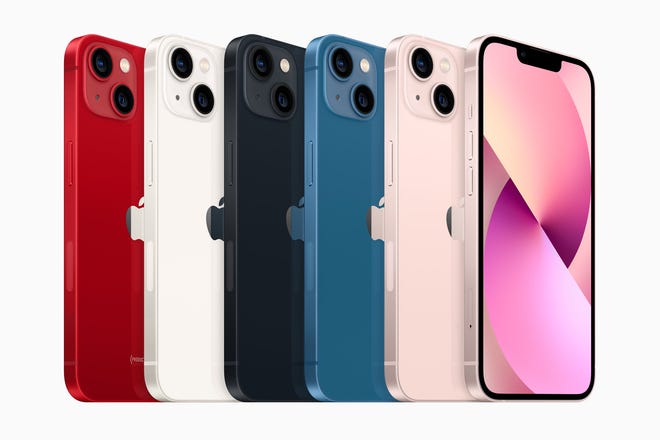
If you have refrained from buying a smartphone until now, Tuesday’s Apple announcements yield a simple list of prices: The iPhone 13 mini starts at $699, the iPhone 13 at $799, the iPhone 13 Pro at $999, and the iPhone 13 Pro Max at $1,099.
For everybody else, the trade-in deals the wireless carriers heralded Tuesday afternoon leave you contemplating a cloud of cost probabilities.
Consider, for example, what you’d pay for an iPhone 13 if you want to trade in a two-year-old iPhone 11 to Apple and then claim each carrier’s incentive:
- At AT&T, you’d get the new phone for free, in the sense of having installment-plan payments showing up as zero on your bill over the next 36 months.
- At T-Mobile, you’d pay $259 after getting $340 in Apple credit and then $200 in billing credits for its $70 Magenta plan. Signing up for T-Mobile’s souped-up $85 Magenta Max increases that billing credit to $500.
- At Verizon, you’d pay $98.88 as $4.12 in monthly installment-plan payments for 24 months.
Because these deals – which also cover trading in many older iPhones and Android phones – are structured as installment-payment plans with set durations, they can tie you to your carrier like the two-year contracts that the carriers once imposed.
“It’s no different from what contracts used to be,” said Carolina Milanesi, president and principal analyst, Creative Strategies.
►Apple's new iPad:Here's how to pre-order the new iPad and iPad Mini
►What Apple announced:iPhone 13 is here, plus a new iPad, the return of the iPad Mini, Apple Watch

Specifically, at AT&T and T-Mobile, phones getting these discounts remain locked to those carriers until you complete the term or pay off remaining balances. (Verizon unlocks phones, even with installment payments due, after 60 days.) Until then, you can’t switch to another carrier or pop in a prepaid SIM for temporary use.
Mark Vena, Senior Director, Smart Home Research Practice, Parks Associates, noted that this risk of lock-in is higher with the discounted wireless services such cable operators as Comcast now offer – tied to cable broadband service that isn’t available nationwide.
“If you move to another region that doesn’t have that cable provider, that is probably not a very wonderful customer experience when you have to pay that phone off,” he warned.
Meanwhile, Apple offers installment-payment plans for new iPhones that keep the phones unlocked, plus its own trade-in discounts. Said Milanesi: “Sometimes you get a bit less money, but it can be a little more peace of mind.”
But for subscribers content with their wireless service, the carrier deals now seem unusually generous.
“AT&T is literally giving it away: the iPhone 13 Pro is free, and the iPhone 13 Pro Max is just $100,” emailed Avi Greengart, president and lead analyst at Techsponential. He credited AT&T’s thirstiness to the Dallas firm needing to shore up subscriber numbers as it extricates itself from such expensive and ill-fated media deals as its 2018 purchase of Time Warner.
T-Mobile, meanwhile, is touting a “forever upgrade” deal that promises up to $800 in trade-in credits on a new iPhone every two years. But that requires Magenta Max, which amounts to a $180 annual premium on a single line over Magenta for such bonus features as 40 GB of mobile-hotspot use.
Meanwhile, shoppers who aren’t hung up on having the newest model should remember that last year’s iPhone 12 just got $100 cheaper.
Jeffrey Moore, principal at Wave7 Research, suggested the iPhone 13’s new features might not outweigh those savings for non-technophiles: “The battery, the processor, and the camera are modestly better, but I think most consumers will be better off getting an iPhone 12 at a $100 lower price point.”
Rob Pegoraro is a tech writer based out of Washington, D.C. To submit a tech question, email Rob at [email protected]. Follow him on Twitter at @robpegoraro.
The views and opinions expressed in this column are the author’s and do not necessarily reflect those of USA TODAY.






